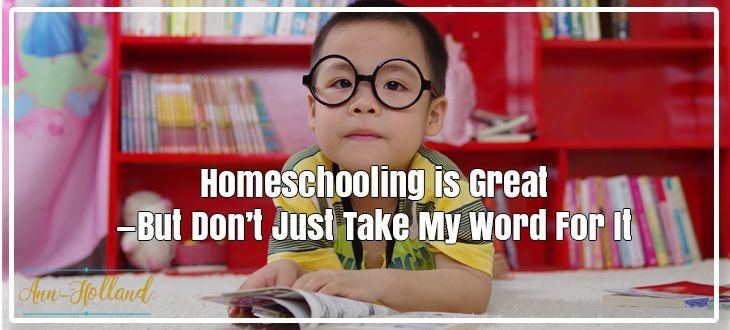
Let’s get scientific on this, shall we?
In Pennsylvania, a group of researchers (Hanna, 2011) comprehensively studied 250 homeschooling families in the urban, rural and suburban areas. This is quite a feat, because it was a longitudinal study, meaning they studied these families for 10 long years, from 1998 until 2008.
In this study, they found out that the families pooled their resources and there was a significant increase in the usage of prepared curricula, acquisition of more textbooks locally, the usage of the public library and technology applications, consultation with instructional specialists/teachers, and networking with other families who were homeschooling.
This sharing of expertise and communication with other families who did the same upgraded and diversified the homeschooling practice in terms of their choices and strategies in delivering the lessons.
Homeschooling is becoming mainstream
The National Home Education Research Institute (NHERI) has indicated that homeschooling is now bordering on mainstream in the United States, and could be the “fastest-growing form of education” in the US (Ray, 2015). The most important result, in case Super Moms still have some doubt about it, is that in the present, there is “no empirical evidence that homeschooling causes negative results compared to institutional schooling.”
As of 2015, based on this same report, there are about 2.2. Million home-educated students in the United States and is continuing to grow over the past few years.
Why do some families choose to homeschool their kids?
According to NHERI, here are the most common answers when families were asked what their reasons for homeschooling are:
Customization and individualization of the curriculum and learning environment for each child;
They can accomplish more academically than in schools;
They can use methods or approaches in teaching other than those in typical institutional schools;
Family relationships between children and parents and among siblings are enhanced;
They can provide “guided and reasoned social interactions” with other youthful peers and adults;
They can provide a safer environment for the children and the youth, in light of all the physical violence, drugs and alcohol, psychological abuse, racism, and improper and unhealthy sexuality that is associate with institutional schools; and
They can teach and impart a particular set of values, beliefs, and worldview to their children and the youth.
How about their Academic Performance?
Interestingly, homeschooled children “typically score 15 to 30 percentile points above public school students on standardized academic achievement tests,” regardless of their parents’ level of formal education or their household income (Ray, 2015).
Because they typically score above average on the tests required for college admissions, these colleges are also increasingly being more accommodating to these homeschooled students.
The “Real World” Success
In the report, adults who were homeschooled as kids were also studied; so far research indicates that they, as compared to the general population:
Have increased participation in local community service;
Have increased attendance on public meetings and increased frequency in voting;
Go to college and succeed at it at an equal or higher rate; and
As adults, internalize the values and beliefs of their parents at a high rate.
What about scheduling?
One study by Meltzer, Shaheed, & Ambler (2016) found out that homeschooled students wake up later and obtain more sleep; they had later homeschooled times, while those in schools are already starting their classes. In the survey they conducted, public or private school students had “poorer sleep hygiene practices”, they report more homework and the use of technology before bedtime. The researchers concluded that starting lessons later might be good for the students to avoid insufficient sleep.
If you are in need to an aid in doing homeschooling, Homeschool Secrets Of Success will surely give you useful insights.
More and more researchers have been looking into homeschooling, and I know that Super Moms like you could really benefit from these studies. In future posts, I would be guiding you on how to start with homeschooling, how to structure your own curricula or where to get resources and materials for this cause, and a lot of stuff that is involved in homeschooling.
But for now, I would like to tell you how it worked for me: I’ve been doing this with my kid, and I can personally say that these researches attests to that.
I’ve had real fun in teaching my kid and seeing him respond to my strategies. I also see how much fun we both have in doing the activities and how much my kid enjoys it. Our bond as mother and child is stronger than ever, and it’s really fulfilling for me.
I am also excited in sharing these information with other Super Moms, and are delighted to hear about ways in which you express your creativity and enthusiasm in structuring an educational environment for your own child. So tell me, what are your own unique ideas about activities you could do in homeschooling your kid?
Awesome post. I've been considering homeschooling my kid when she grows up, and it is nice to see some statistics supporting this.
Thank you rotfoot!!
I too am happy to see peoples engaging in homeschooling its a efficient way to educate our little one's :D
This is awesome! I love being able to share facts about the benefits of homeschooling when dealing with a doubter. Did you know that Stanford University accepts roughly 5% of it's applicants but accepts roughly 27% of its homeschooled applicants?
Yes you can share some facts here!! let's make a great community together! :D
And Wow I didn't know that!!